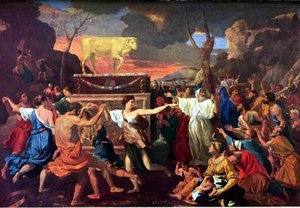Golden calf
|
|
In the Hebrew Bible the golden calf was an idol made by Aaron for the Israelites during Moses's unexpectedly long absence. It is first mentioned in Exodus 32:4. In Hebrew the incident is known as "Chet ha'Egel" (חטא העגל) or "The Sin of the Calf".
When Moses went up onto Mount Sinai to receive the Ten Commandments (Exodus 19:20), he left the Israelites for forty days and forty nights (Exodus 24:18). The Israelites feared that he would not return, and asked Aaron to make gods for them (Exodus 32:1). The Bible does not note Aaron's opinion of this request, merely that he complied, and gathered up the Israelites' golden earrings. He melted them and constructed the golden calf.
Aaron also built an altar before the calf, and the next day, the Israelites made offerings and celebrated.
The Lord told Moses that his people had corrupted themselves, and that he planned to eliminate them, but Moses argued and pleaded that they should be spared (Exodus 32:11); the Lord relented. Moses went down from the mountain, but upon seeing the calf, he too became angry. He threw down the tablets upon which God's law had been written, and broke them. He ground up the golden calf, mixed its powder with water, and forced the Israelites to drink it. Then he gathered the sons of Levi, and set them to slaying a large fraction of adult males. Nevertheless the Lord stated that he would one day visit the Israelites' sin upon them.
Since Moses had broken the tablets, the Lord instructed him to return to Mount Sinai yet again (Exodus 34:2) to receive a replacement.
Among the Hebrews' neighbors in the Ancient Near East and the Aegean, the Aurochs, the wild bull, was widely worshipped, often as the Lunar Bull and as El. Its Minoan manifestation survived as the Cretan Bull of Greek myth.
The story of the Golden Calf is mentioned in the Qur'an (see Musa (prophet)) in many Suras (e.g. Al-Baqara, An-Nisa, Al-A'raf, Ta-Ha).
The Golden calf (Gouden kalf) is also the Dutch version of the Oscar.

